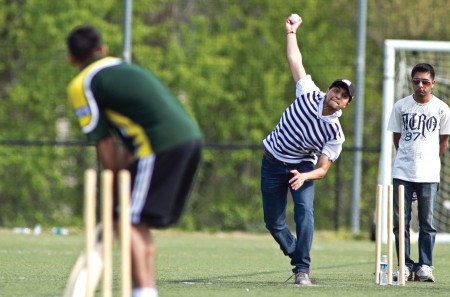International Week, an annual event enabling the George Mason University community to experience various cultures from around the world, is taking place on the Fairfax campus Monday through Saturday. Other than the International Dinner Dance, most events are free.
The theme of the 32nd International Week is “Pause … and View the World Around You! Play … and Explore the World Around You!” The idea is for students to recognize, interact with and experience diversity on campus.
InternationalWeek comprises numerous events such as the Dance Competition, Cultural Workshop Series and International Dinner Dance. These events would not be possible without the collaboration between the Office of International Programs and Services and the Office of Student Involvement.
Research is a vital component of preparations for International Week, said Saraschandra Arveti, a graduate assistant at the Office of International Programs and Services and the Office of Diversity Inclusion and Multicultural Education.
“There are three F’s [in any event] — fun, food and fiesta,” Arveti said. “But in international events, there’s an additional F, which is fact.” Much of Arveti’s research into food, music and culture has proven directly applicable to the International Week events.
The Dance Competition will be held from noon to 2:30 p.m. on Tuesday at Dewberry Hall in the Johnson Center. This is a ticketed event, and free tickets are available at the Office of Student Involvement, located in The HUB (SUB II).
The competition will include performances from groups including the Afghan Student Association, Arab Student Association, GMU Bhangra, Bengali Patriots Association, Filipino Cultural Association, Hellenic Society, Hispanic Student Association, Indian Student Association, Mason Ke Rang, Nepalese Student Association, Pakistani Student Association and Persian Club. Each group will showcase the dances, costumes and music of its culture on stage.
“I’m nervous, but we will see how it goes. Planning is very hard and practicing is stressful, but I know everything is going to turn out well,” said sophomore Vicki Georges, who is one of the dance competitors from the Hellenic Society. “Everybody comes together and gets to see people dancing.”
The top three groups will perform at the International Dinner Dance from 7 to 10 p.m. on Friday at Dewberry Hall. Those who attend the dinner will meet new people from around the world and get to know about a spectrum of cultures, all while tasting food from different countries. Tickets for this event must be purchased at the Center for the Arts box office.
All the workshops will be held Tuesday through Thursday at Patriot Lounge in SUB I and on the Quad. Siri Sunkara, a graduate student from India who will conduct a henna workshop, said she is excited to create her own designs for the temporary tattoos. She said students interested in receiving a free henna tattoo should attend her workshop, during which Sunkara will also explain the history of henna tattoos.
In addition to the henna workshop, there will be a Roma-inspired dance workshop and a workshop to make leis, the traditional Hawaiian flower necklaces. The Roma-inspired dance workshop will be taught by a Russian instructor and will introduce participants to several styles and techniques of dance from around the world. Participants in the lei workshop will create their own leis using the tops of soda cans.
“We want to make these workshops for students so they can make themselves comfortable and relaxed,” said Birgit Debeerst, an assistant director for programming at the Office of International Programs and Services. “We want them to learn but in a fun way, and we don’t want them to feel trapped as if they’re in a classroom.”
A staggering amount of effort goes into putting International Week together.
“There are a lot of responsibilities. Planning is fun but very sensitive,” Arveti said. “We try not to put anything offensive about someone’s culture when we create posters, for instance. But I enjoy it.”
International Week started in 1981 and for the first few years had no official theme. Eventually it developed a purpose of sharing diversity.
“In the late ‘80s through the late ‘90s, themes appeared in more political scenes whereas in the 2000s, they appeared in more global celebration of all the countries getting together,” Debeerst said.
“Most of the events are organized by the international-related organizations, so we want to see more American students participating and learning about different cultures,” said Vivian Dao, a senior peer educator in the Peer Empowerment Program. For more information, visit iweek.gmu.edu.







Comments